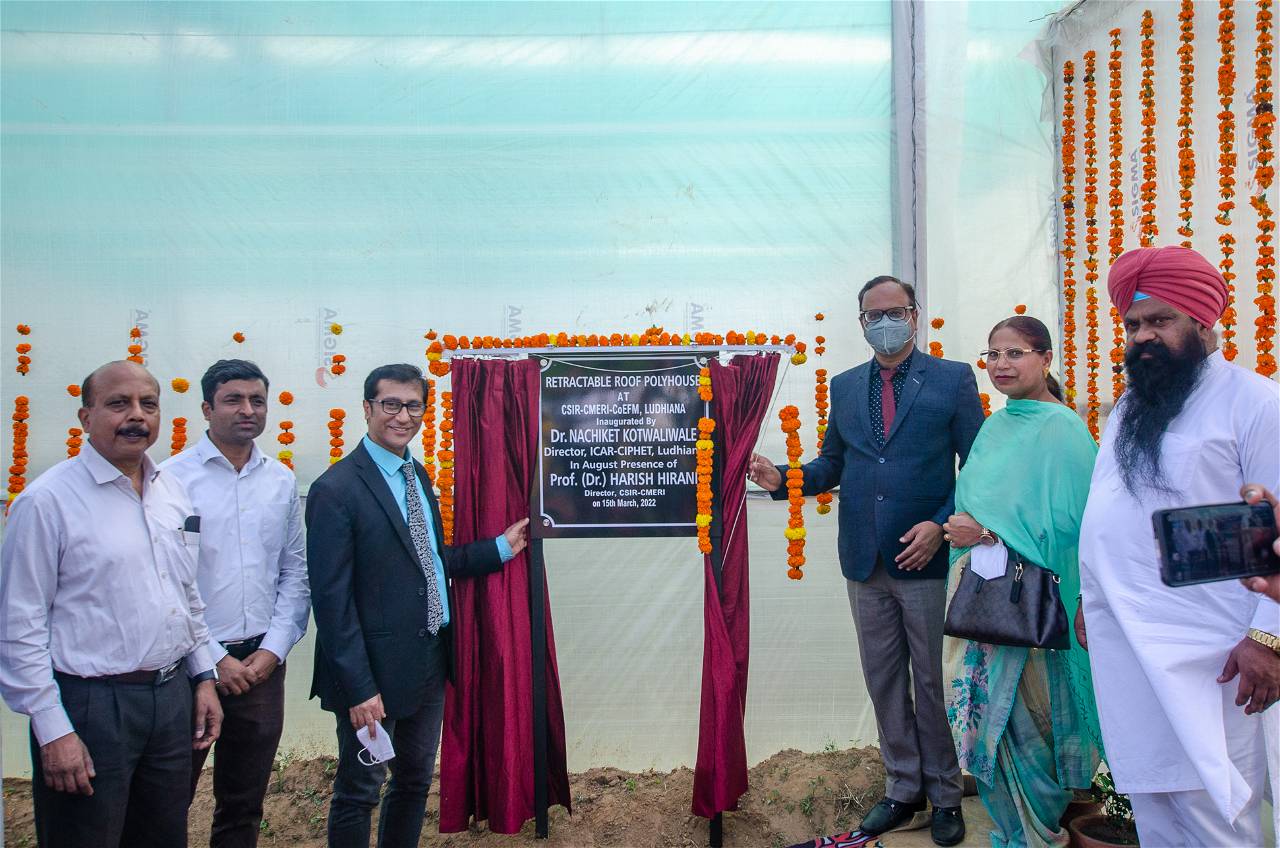
Indian farmers face number of problems such as excessive or insufficient cold, heat, rain, wind, and other factors associated with insufficient transpiration, and also crop losses in India due to insect pests is about 15% at present and this loss may increase as climate change lowers the plant defense system against insects & pests.
To some extent, these problems can be overcome by conventional polyhouse. Conventional Polyhouse have a stationary roof to reduce the effect of weather anomalies and pests. However, there are still disadvantages due to roof covering which sometimes lead to excessive heat, and insufficient light (early morning).
Besides this, they are also prone to insufficient levels of CO2, transpiration and water stress. A combination of open field conditions and conventional Polyhouse conditions is a more robust way to deal with climate change and associates problems in the future.
Prof. (Dr). Harish Hirani, Director, CSIR-CMERI briefed that CMERI Extension Centre, Ludhiana has indigenously developed a “Retractable Roof Polyhouse Technology”. This all-weather structure will have an automatic retractable roof which will be operated based on weather conditions and crop requirements from the conditional database using PLC software.
This developed technology will help farmers to cultivate both seasonal and off-season crops which can fetch higher yield, firmer and high shelf-life produce by creating optimal indoor micro-climate conditions compared to conventional open field tunnels & naturally ventilated poly houses, and also it reduces irrigation and disease problems, low labour requirement, environmentally friendly as it eliminates weedicides use, promote organic food production as it is viable technology for organic cultivation with reducing cultivation cost.
Dr. Nachiket Kotwaliwale, Director, ICAR-CIPHET, Ludhiana inaugurated a “Retractable roof polyhouse technology” at CMERI Extension Centre, Ludhiana in the presence of Prof. (Dr). Harish Hirani, Director, CSIR-CMERI and dedicated technology to Indian farmers.
Jagdish Manikrao, Senior Scientist, who has to lead the research team on the development of this technology explained that the retractable roof used to manipulate sunlight quantity, quality & duration, water stress, humidity, carbon-di-oxide levels, and crop & soil temperatures. The cropping area in the retractable roof polyhouse is about 384 Sq. m.
The Director CSIR-CMERI, also briefed that as the scientific experimental data on the advantages of this newly developed Polyhouse system are lacking, therefore the cultivation of horticultural crops under both naturally ventilated Polyhouse and retractable roof poly house for comparing the crop production and produce quality is under progress.
With the installation of Naturally Ventilated Polyhouse and Retractable Roof Polyhouse side by side, we can get the required scientific data and by analyzing the results we can enhance productivity and the developed facility will be used as a demonstration farm to the farmers.
About Retractable Roof Polyhouse Technology
The developed retractable-roof polyhouse is an improvement to the current poly house design with a retractable roof feature suitable for protecting crops from adverse climate conditions. It combines the benefit of both the natural outdoor environment and a controlled greenhouse environment to allow growers to extend harvest seasons in order to realize the higher prices, increasing yields which reduce the fixed costs per case and eliminating the supply disruptions due to erratic weather so that growers never lose a customer. Helps in growing organically or chemical-free crop in order to achieve higher revenues and lower production costs
A retractable-roof polyhouse has a roof that can be opened and closed, partially or fully. The grower can open the roof when weather conditions are favorable to plant growth and the roof can be closed when the crops need protection. When the roof is open, polyhouse of this type provides plants with increased light levels and fresh air.
Crops Grown in Retractable-Roof Polyhouse
-
Vegetables that can be grown include Cucumber, Cherry Tomoto, Cabbage, Capsicum, Brocolli, Lettuce, Bitter Gourd, Cauliflower, Coriander, Spinach, etc.
-
High-value floriculture - Carnation, Gerbera, Orchids.
Advantages Compare to Conventional Polyhouse
-
Retractable roof polyhouse technology has the following benefits compared to conventional polyhouse
-
Higher yield, firmer, high self-life produce compared to conventional open field, tunnels & naturally ventilated poly houses
-
Prevents crop overheating by cutting Infrared radiation, since the crops are more photosynthetically active than conventional growing methods the plants tend to better yield and quality
-
Trap more heat or can able to heat up soil and us it as a sink when night temperatures are low
-
Better & uniform control on indoor humidity by adjusting the vents
-
Uniform air & CO2 exchange from the atmosphere throughout the polyhouse
-
Better plant vegetative by manipulating humidity and light
-
More viable technology for organic cultivation
-
As the plants can able to access direct sunlight can increase the plant density than other conventional systems
In conventional poly house roof is stationery, the roof is always in the closed position and there are disadvantages due to the covers of poly house
In polyhouse Increase in temperature
Early morning and late afternoon insufficient light
Insufficient levels of carbon dioxide, insufficient transpiration, water stress and crop is more susceptible to pests and diseases
How it Benefit to Formers
This technology is very beneficial to farmers
-
Farmers can cultivate both seasonal and non-seasonal crops throughout the year which can fetch higher value and income
-
Less requirement of pesticide use as the crop is less susceptible to pest and diseases.
-
Increase in the harvesting period
-
Reduced Cost of crop cultivation
-
Farmers get higher yield and quality of products throughout the year
-
Nursery can be grown before transplanting into an open field
Cost to Build a Poly House
Retractable roof polyhouse: Rs. 1500 to Rs. 3000 per square meter depending on the level of automation from basic to fully automatic depending upon crop requirements and weather changes.
Uniqueness:
-
Resilient to climate changes.
-
Automatic control system based on crop requirements and weather conditions










